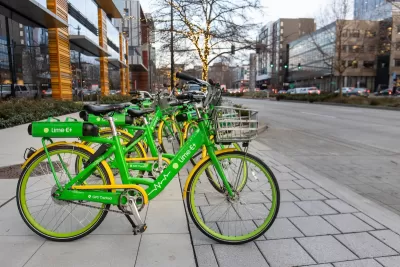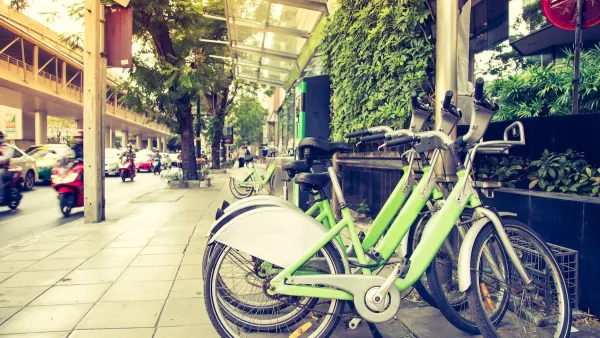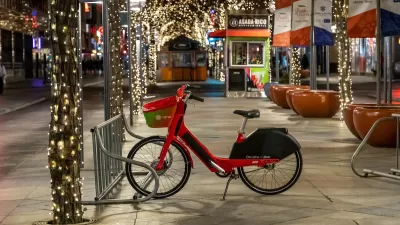The city’s shared bikes and e-scooters provided half as many trips as a $2 billion tunnel.

Seattle’s shared Lime bike and scooter fleet provided over 24,000 rides per day in July — half the average number of vehicles that pass through the SR-99 tunnel that crosses downtown, writes Tom Fucoloro in Seattle Bike Blog.
Fucoloro notes that the bike and e-scooter system comes at no cost to the city — in fact, Lime pays Seattle to operate there — while the SR-99 tunnel cost $2 billion. Lime has been one of several operators in Seattle, but its growing success is pushing others out.
Fucoloro suggests that the city could benefit from a more formal public-private partnership with Lime, pointing to the effectiveness of the bike share system in Long Beach, California as an example.
Additionally, Fucoloro suggests that more on-street bike and scooter parking would double as curb extensions that improve pedestrian safety. “ Dedicating space at intersections across the city to bike and scooter parking would embrace the fact that these vehicles are an important part of our city’s transportation system while also keeping the devices out of walkways and curb ramps where they impede accessibility.”
FULL STORY: In July, Lime bikes and scooters carried half as many trips as the $2B SR-99 tunnel

Maui's Vacation Rental Debate Turns Ugly
Verbal attacks, misinformation campaigns and fistfights plague a high-stakes debate to convert thousands of vacation rentals into long-term housing.

Planetizen Federal Action Tracker
A weekly monitor of how Trump’s orders and actions are impacting planners and planning in America.

In Urban Planning, AI Prompting Could be the New Design Thinking
Creativity has long been key to great urban design. What if we see AI as our new creative partner?

King County Supportive Housing Program Offers Hope for Unhoused Residents
The county is taking a ‘Housing First’ approach that prioritizes getting people into housing, then offering wraparound supportive services.

Researchers Use AI to Get Clearer Picture of US Housing
Analysts are using artificial intelligence to supercharge their research by allowing them to comb through data faster. Though these AI tools can be error prone, they save time and housing researchers are optimistic about the future.

Making Shared Micromobility More Inclusive
Cities and shared mobility system operators can do more to include people with disabilities in planning and operations, per a new report.
Urban Design for Planners 1: Software Tools
This six-course series explores essential urban design concepts using open source software and equips planners with the tools they need to participate fully in the urban design process.
Planning for Universal Design
Learn the tools for implementing Universal Design in planning regulations.
planning NEXT
Appalachian Highlands Housing Partners
Mpact (founded as Rail~Volution)
City of Camden Redevelopment Agency
City of Astoria
City of Portland
City of Laramie





























